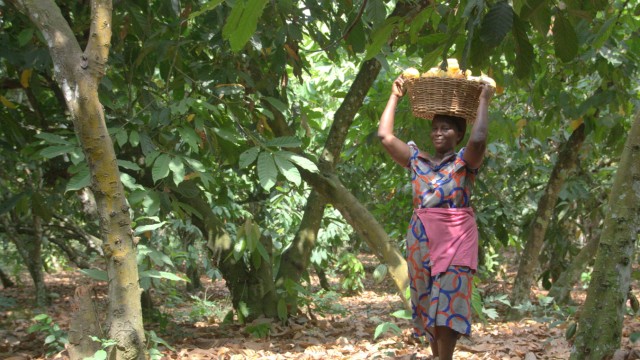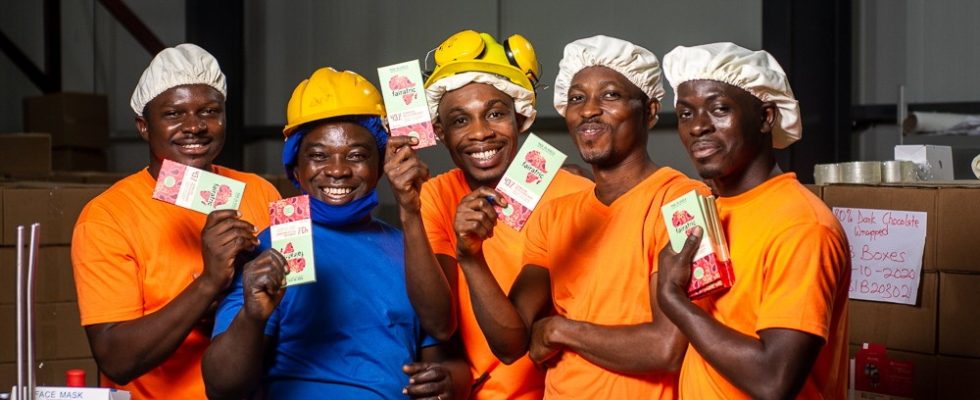Hendrik Reimers is sitting with his second cup of milky coffee in the “A Little Lost” café not far from Munich Central Station. A place he likes. There are young people behind the counter, the old table where Reimers opens his laptop has vintage charm, the foam in the cup is made from oat milk, so it’s vegan. The Fairafric chocolate factory founded by Reimers now also produces vegan products. There are a good dozen varieties under the name Fairafric, based on cashews or with milk. Above a stylized outline of the continent, all panels read “Made in Africa” in capital letters. Below it in small letters: “Creating Jobs, Loving Chocolate.” That’s Reimer’s approach: the love of chocolate and the desire to create jobs. In his company, the cocoa beans are not processed in Switzerland or Germany, but rather where they grow. “From tree to bar” in Africa, specifically in Ghana.
Fairafric has set up a production site there. For Reimers, Ghana is one of the African countries that “has done its homework best.” By this he means the advantages that the country offers to motivated entrepreneurs. “Foreigners are allowed to set up companies without any serious restrictions,” he says. The country is more peaceful and safer than France, has a reliable legal system and you can import ingredients and machines for production duty-free.
Hendrik Reimers, founder of Fairafric.
(Photo: Fairafric)
Reimers is 41. “Yes,” he sighs. His full beard is mottled gray and his dark hair is tied in a bun at the back of his head. Perhaps in recent years some worries have left an extra mark on his face. But Reimers, tall and slim, appears youthful. Like someone who likes to play around with their kids on the weekends. There isn’t much opportunity for that. He has no time for hobbies, says Reimers. But when he’s at home in Herrsching, he sits by the children’s bedside with a book in the evening whenever he can. To do this, he sometimes skips a meal with potential donors.
The family of four lived in Ghana for a year in order to “develop a better understanding of the country” and to always be available to answer questions from employees. It was also a concession to the people there, says Reimers. To see where jobs could be created and ideas developed. The result is a chocolate school for handmade chocolates. It is the first of its kind in Ghana.
Reimers and his wife felt comfortable on the African continent. The family still came back to Germany in the summer of 2022, faster than originally planned. The move was a “business decision.” The organic premium range of chocolate bars has collapsed sharply due to the war in Ukraine, the energy crisis and inflation, says Reimers. From Germany he is now closer to the ears of customers again, customers who value organic quality and who can be convinced by the company’s history. Private bakeries, for example, to whom Fairafric supplies chocolate sticks for their pains au chocolat. With the team in Munich, Reimers is now thinking intensively about how new markets can be developed.
In addition to bar production, there is now a further focus on handmade products such as chocolate-covered fruits and chocolate as an ingredient, for example for muesli or for coating cookies and bars. Fairafric will produce more chocolate in teardrop form in the future. “We are growing very strongly overall in the ingredients segment,” says Reimers. Production runs for 24 hours. “It is currently at capacity.”

The cocoa plantation is about an hour’s drive from the capital Accra.
(Photo: Fairafric)
The factory is surrounded by cocoa plantations in Amanase near Suhum, a good hour’s drive from the Ghanaian capital Accra. What is here didn’t exist four years ago. The first chocolate production took place in 2016, at that time with a partner producer. In the beginning there was hardly any infrastructure for manufacturing and everything that goes with it. They had to import the cardboard boxes into the country. Also the Euro wooden pallets, the machines anyway. You are from Switzerland. Everything that belongs to an independently operating company had to be set up. For two years, Fairafric has had its own marketing department with product photography and graphic designers, and a local printing company implements the creative ideas. She first had to develop the standards. The printing company is now also working on other projects.
In 2022, two million bars were produced in Amanase; this year, according to Reimers, there will be 40 to 50 percent more. A lot for the German market. Very few consumers give serious thought to where the 9.2 kilograms of chocolate that we consume on average per person per year comes from. In fact, Ghana is one of the leading producing regions of high-quality cocoa in the world. However, the beans are usually not processed further where they are harvested. Local cocoa farmers earn only a fraction compared to producers in the countries of the global north.
The online shop on the Fairafric website shows packaging that is based on the colorful, typically African, patterned wax batik design. The boards are also covered in plastic-free, degradable film. The majority of the chocolate is sold through organic shops in Germany, Austria, Switzerland, but also in Ghana itself. The organic supermarkets Basic and Denn carry the brand. Reimers would also deliver to discount stores.
With twelve varieties, choosing is not easy. In a pink cover there is milk chocolate with 43 percent cocoa content and fleur de sel. It is made with powder from the Schrozberg dairy in Demeter quality, is not too sweet, just a little dry in the mouth. The vegan tiger nut and almond version is surprisingly creamy with 70 percent cocoa content. The 80 gram bars cost around 2.70 euros. An average price for an organic chocolate.
“The business model is our marketing,” says Reimers. The story and the people behind the name, who set out to produce the “fairest chocolate in the world”, climate-neutral, delicious and from African hands. The first production seven years ago was financed through a so-called Kickstarter campaign through online advance sales.
Banks in Ghana want 30 percent interest on a loan. Conditions that would never have led to the construction of the factory and its equipment. Fairafric needed seven million euros. This was only possible with the help of a lot of people, says Reimers. The financing was spread across many shoulders. The company received a loan of two million euros through the Federal Development Ministry’s Africa Connect program. Fairafric is now a corporation with currently around 500 shareholders. But more than half of the development capital comes from the “crowd,” as Reimers says. From people who, like him, want to get things moving for the better for the people in Africa.
Reimers originally comes from Bremen. He studied economics in Dortmund and was most recently employed as a sales manager in a software company in Munich. A job that was so well paid that he was able to build up reserves. To survive the tough early years, as Reimers says. It was clear to him early on that he wanted to pursue alternative career paths. “I would probably never have done any of this if I had been aware of what was coming to me,” he says.
What if it goes wrong? “I would fall softly,” he says
There were many small stumbling blocks that he could hardly avoid because he initially had little understanding of the chocolate business, of cocoa cultivation, of production, of brand competition in the supermarket. He couldn’t have predicted the pandemic. Fairafric has survived multiple crises since the company was founded in April 2016 and has still grown steadily. There are now 100 employees. Reimers is proud to have Ghanaian management. His vision is to create qualified and well-paid jobs for many more people: 10,000, he says ambitiously.
This number is also on the Fairafric website. He believes the first 100 people are the hardest. The factory is standing, despite Corona, wars and currency devaluation. “If you show a certain willingness to suffer, then you will get a lot of help,” believes Reimers.
Fairafric wants to be profitable in twelve to 18 months. What if chocolate production doesn’t work in the long run? He can actually hardly imagine it, says Reimers. “But I would have a soft time in Germany. I can still call the doctor for my children in an emergency and they can go to school and university.” In Ghana this is not the case at all. And then he says before he dials into a video call: “If you know that it makes a difference for the people there that we exist, that motivates you to get up in the morning and go to the office.”

